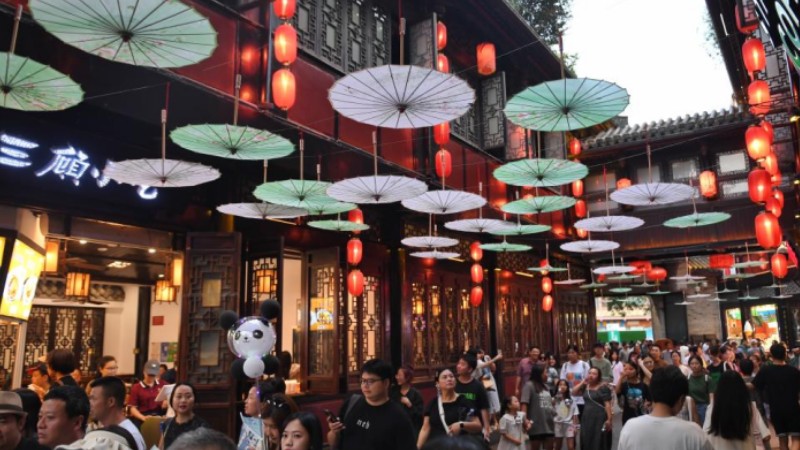Envoy: Sustain good momentum

Chinese Ambassador to the United States Xie Feng (right) has a fireside chat with Steve Clemons, editor-at-large of news platform Semafor, at the Aspen Security Forum in Colorado, US , on Wednesday. [Photo by Zhao Huanxin / China Daily]
The existing prohibitions by the United States on Chinese imports of equipment used to make advanced chips are "like restricting the other side to wear outdated swimwear in a swimming contest, while you yourself are wearing a Speedo", Beijing's top envoy to Washington told the audience at the Aspen Security Forum on Wednesday.
It was one of the moments during the gathering in Aspen, in the US state of Colorado, in which the audience burst into laughter at a speaker's spontaneous and smart comments.
However, Chinese Ambassador to the US Xie Feng also had more serious thoughts to share, especially on how the two countries could stabilize their relations following a number of trips between Washington and Beijing by high-ranking officials.
He also said that China would definitely respond to "provocations", even though Beijing does not want a trade or tech war.
A conversation with a Chinese ambassador has become a staple of the annual Aspen event, a US national security and foreign policy conference, which this year addresses questions such as how the world can responsibly harness artificial intelligence.
Like previous forums, this year's four-day event, which ends on Friday, has been laden with China-related topics.
Shedding light on how the US and China can de-escalate tensions and cooperate on issues of common concern, Xie told a packed hall on Wednesday that the foundations of China-US relations remain weak in the wake of a series of visits by high-ranking officials in recent weeks.
Those trips, including the first by Secretary of State Antony Blinken in his current capacity, followed by that of Treasury Secretary Janet Yellen and, most recently, John Kerry, US special presidential envoy for climate, were "a good sign" and offered "a rare opportunity" to stabilize bilateral relations, which both sides are hoping to rescue from further deterioration.
"But the challenges are still abundant, and the foundations are still fragile. So we need to keep up and also to sustain this good momentum," he said.
'Essential priorities'
Xie singled out three "essential priorities" for China-US relations going forward: shortening the negative list, which means overcoming obstacles and managing differences; extending the positive agenda by expanding areas of cooperation, starting from low-hanging fruit like increasing flights and travel visas; and seeking out people who support improvement of bilateral ties.
The former vice-minister of foreign affairs said that there used to be more than 100 dialogue mechanisms between the two countries until these were stalled by the US side in 2018.
"I think the two sides have waited too long. Why don't we start renewing them? If not all, then starting from 50, or 30. I think that is possible," he said.
Xie, who assumed the ambassadorial post nearly two months ago, said that since his arrival, he has had a perception of so-called "political correctness" in US society, which has surprised him.
"I've been talking to as many American friends as possible. I think there are still a large number of supporters for this relationship, but they seem to be under pressure," he said. "One of my jobs here is to seek them out."
Outside the forum venue, signs displayed quotes from participants in previous Aspen forums that echoed this year's theme.
One of these presented a quotation from Joseph Nye, dean emeritus of Harvard Kennedy School, "There are some issues where we are going to have to work with China, even while there are other areas where we will be competing with China, and we are going to have to learn to do that simultaneously."
Xie said China does not shy away from "competition", but the way it is defined by the US is unfair.
He said that the US is trying to win by keeping China out. For example, it banned Huawei, even though the company has come up with an agreement to have no "back door" in its technology.
"So how can you imagine a competition without one side even on the ground?" he said.
He also said that the US is rallying allies to "encircle" China, making the "competition" with China not a "one on one" but "many on one".
In commenting on US attempts to frustrate Chinese efforts to secure the most advanced chips, he compared the competition to a swimming contest.
The ambassador noted that up to now the US had put at least 1,300 Chinese entities or personnel on its sanctions list.
"These people were forced out of a job and their families suffered greatly," Xie said, adding that there were reports that Washington is considering an outbound investment review mechanism, as well as further prohibitions on the export of AI chips to China.
"The Chinese government cannot simply sit idly by. There's a Chinese saying that 'we will not make provocations, but we will not flinch from provocations'," he said.
"China definitely … will make our response, but definitely it's not our hope to have a tit for tat. We don't want … a trade war, technological war, we want to say goodbye to the 'Iron Curtain' as well as the 'Silicon Curtain'."
During the conversation, Xie said China "definitely" does not seek hegemony or to have conflict with the US, nor does it want to challenge or displace the US.
"We want to grow together with the US. So I think the Thucydides Trap is not inevitable," he said, referring to the narrative that when a rising power causes fear in an established power, this escalates toward war.
"The world has changed, now we have to look beyond; we should say goodbye to the Cold War mentality. We should say goodbye to bloc confrontation. We should say goodbye to the zero-sum game, and we should … avoid a major country conflict," he said.
In commenting on the Taiwan question, the envoy said that the most fundamental thing is to return to the one-China principle, and the most important thing is that the three joint communiques between China and the US should be implemented.
"And thirdly, I think the provocative adventurist moves by the Taiwan separatists should be contained. And now the priority for us is to stop Lai Ching-te from visiting the United States, which is like a great rhino charging at us," he said.
Beijing has lodged a strong protest to Washington over a planned visit by Lai, Taiwan's deputy leader, urging Washington not to cross "the first red line in China-US relations".
Photos
Related Stories
- Senior Chinese diplomat meets with Henry Kissinger
- Diplomat: US needs Kissinger-style wisdom
- China-U.S. economic, trade ties as inseparable as "threads and needles": Chinese diplomat
- Chinese vice president meets U.S. special presidential envoy for climate
- Chinese defense minister meets with Henry Kissinger in Beijing
- Country's path of peaceful development boon for world
- Li urges close climate cooperation
- Chinese premier meets U.S. climate envoy
- Beijing protests Taiwan deputy leader's US visit
- Expectations high as China-US climate cooperation talks begin
Copyright © 2023 People's Daily Online. All Rights Reserved.









